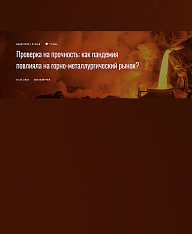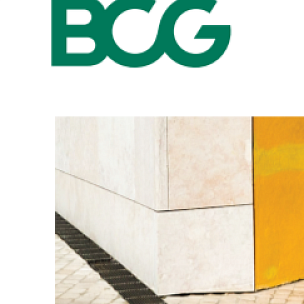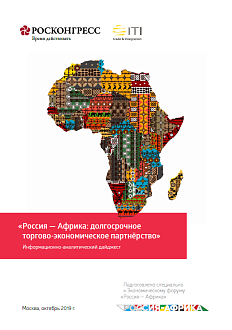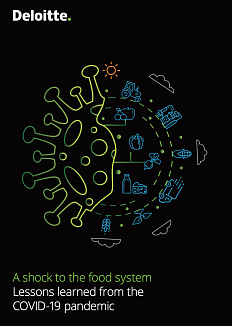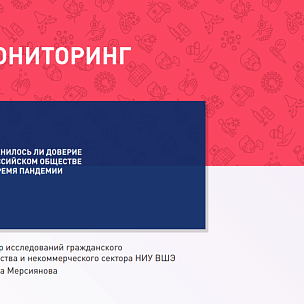KPMG Mustread presents an article that addresses the situation in the mining and metal production market after the coronavirus pandemic. The article reflects sentiments of major international and Russian metal production companies as well as demand behavior outlook for the post-crisis period.
The Roscongress Foundation presents the salient points of the publication accompanied by fragments of broadcasts of relevant panel discussions from the business programme of international events held by the Roscongress Foundation.
The COVID-19 pandemic has challenged mining industry, but the main damage was inflicted by falling demand in metals and bulk load in regions with recessed economic activity.
Output of the main Russian metal production product (steel) in 2019 was equal to 71 mln tons. Output of aluminum was equal to 3.87 tons, copper — 983,000 tons, and nickel — 156,000 tons. Approximately 40% of steel is produced for the domestic market, and 80–90% of non-ferrous metals is exported; so, the Russian manufacturers are entirely dependent on the economic situation in the recipient countries. However, compared to steel, non-ferrous metals can be traded at stock exchange, so sales and distribution is not a problem.
Traditionally, Russian metal production companies are in the most favorable position worldwide as they have the smallest expenses: domestic raw materials and low Russian ruble exchange rate. Moreover, major steel-casting companies nowadays have a good financial standing: insignificant debts, great savings, opportunities in capex decrease, etc.
Main European steel manufacturers, such as Arcelor Mittal, Tata Steel Europe, Liberty Steel, Trametal (MetInvest’s asset in Italy) have already announced decrease in production. According to S&P Globalratings forecast, steel shipments in Europe may decrease by 10% this year. Russian output in January-May decreased by 3.1% (on a year-over-year basis) due to falling demand at the domestic market and issues in steel scrap picking (40% of steel in Russia is produced from scrap).
Russian metal production companies have redirected export (even Magnitogorsk Iron and Steel Works (MKK) that has the greatest domestic market share) mainly to the Middle East, North Africa and South-East Asia. Thus, it helped to maintain capacity and overcome crisis.
Nevertheless, the authors note that the current market situation is better than during the 2009 crisis when demand in steel decreased by 40%. According to World Steel Association annual forecast, global steel demand has decreased by 6.4%, up to 1,654 mln tons. Next year it is expected to recover up to 1,717 mln tons, i.e. to exceed 2020 outlook by 3.8%.
The worst times for the mining and metal production market are left behind. Gradual lifting of restrictions imposed due to the COVID-19 pandemic, recovery in demand and production helped to normalize the situation. Incentive policy of the states aimed at economic recovery and decreasing dollar exchange rate, will significantly support the market in the nearest future.
The Russian market can also witness recovery in demand. For example, MKK sales volume at the domestic market in May was equal to 380,000 tons, in June — even 540,000 tons, and may exceed 580,000 tons in July (as forecasted). Furthermore, export sales have fallen from 40% in May to 23% in June.
But there still is a risk that trade barriers after the crisis will be increased. For example, the EU is carrying out an anti-dumping investigation of flat products in Turkey and considers a possibility to increase import duties for Russia. Competition in the Middle East is likely to increase due to protective measures in Egypt and Saudi Arabia. Thus, Egypt has implemented a duty of 10% for imported steel products, and Saudi Arabia has increased import duty from 5% to 10–15%.
The experts note that the previous crisis is different as consumption has shown less decrease. However, a scenario of overcoming the crisis has not changed: the companies shall have safety margin, and the state shall stimulate economy through investments in infrastructure.
For more information about construction as a sector with a sizeable share in many economies, rising level of digitalization, and shifts in consumer sentiment in real estate, please see the Exploration and mining, StayHomeEconomy, COVID-19 and Export Promotion.


